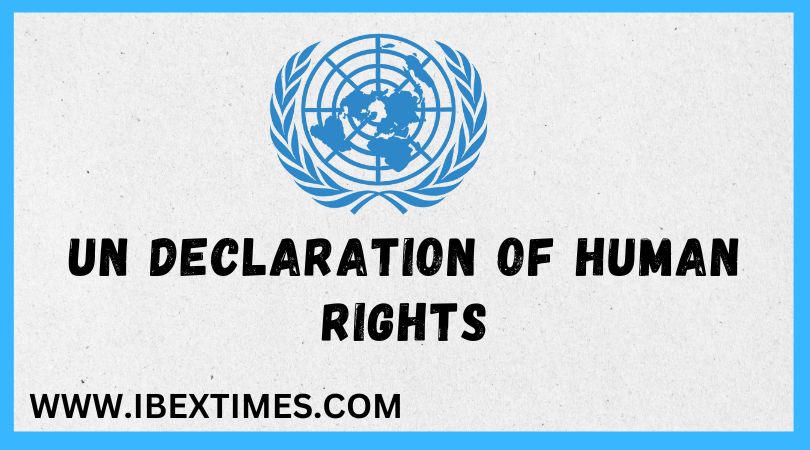In this article, I will discuss the fundamental rights provided in the UNDHR (Universal Declaration of Human Rights).
What is the UNDHR?
The UNDHR is a landmark achievement in the recognition of human rights. This is a document containing basic rights prepared by delegates with legal and cultural backgrounds across the globe. Once drafted, the United Nations General Assembly proclaimed this document on December 10, 1948, in Paris as a common requirement of achievement for people in all parts of the world.
What are the fundamental rights?
The term ‘fundamental rights’ refers to a set of rights that the constitution of a UN member state should guarantee to its citizens. In other words, they are laws stating what facilities, opportunities, and freedom the citizens can enjoy in a state. Given that no government and other state institutions can take these rights away from the citizens.
A detailed account of fundamental rights enshrined in the Universal Declaration of Human Rights is given below:
#1 Right to Self-Determination
- All people will freely determine their political status and pursue their socio-economic and cultural development.
- People may utilize their natural resources independently of any outside power to meet their own ends.
- No un-representative government may deprive them of their own means of subsistence.
- States having control of Non-Self-Governing territories shall respect and take steps for the realization of right of self-determination as per UN Charter.
#2 Right to Life
- Every person has the inalienable right to live.
- Nobody will deprive people of this basic right to life.
- Death can only be imposed for mot severe crimes as per the state law in force.
- Anyone sentenced to death may seek amnesty which may be granted by a competent authority.
#3 Right to Freedom of Assembly
- the right to a peaceful gathering of people shall be recognized.
- no restrictions shall be imposed on the exercise of this right except on those placed in accord with the law in the interests of national security, public safety, and the greater good of the society.
#4 Right to safeguards from slavery and forced labor
- According to this right, nobody shall be subjected to slavery and slave-trade in any form.
- No one shall be subjected to forced or bonded labor
#5 Right to Freedom of Thought and Religion
- Everyone shall have the right to freedom of thought.
- All people shall enjoy the freedom to have and practice his/her religion.
- Nobody will be forced to adopt a religion or belief other than of his/her own choice.
#6 Right to Parenting According to Ones’ Parents Will
Parents shall decide with respect to the religious and moral education of their children as per their own faith.
#7 Right to Freedom of Expression
- Everyone shall have the right to freedom to seek, receive, and convey information and ideas of all kinds.
- The ideas can be sought, received, and imparted through any means of media of his/her own choice.
- This right is subject to the conditions e.g. it should not violate the rights and tarnish reputations of others.
#8 Right of Freedom of Association
- All people are entitled to the right to freedom of association without any restriction.
- They may form and become part of trade unions to safeguard their rights and interests.
- This right shall not be restricted except when the law requires so in the interests of public safety etc.
#9 Right to Privacy
- Nobody will unlawfully intrude on privacy, matters related to family, home, or correspondence of a person.
- Everyone may seek the protection of the law against any attack on his/her honor and reputation.
#10 Right to Liberty
- The liberty of a person shall be protected except when the law requires so in the interests of national security.
- Anyone deprived of his liberty by arrest or detention shall have the right to seek justice from a court of law. The court may decide on the illegitimacy of his/her arrest without any delay.
- Any person subjected to illegal detention may claim compensation through competent judicial authority.
#11 The right to remedy for violation of fundamental rights
- The government will ensure remedy for violation of any recognized fundamental rights of people
- It will ensure that any person seeking such a remedy shall be heard by a competent authority. This competent authority may be judicial, administrative, and political in nature as provided for by the legal system in force
- A competent authority shall ensure that the granted remedies are enforced.
#12 Right to Freedom of Movement
- All people shall have the right to freedom of movement.
- They shall have the liberty to choose his/her residential place within the territory of a state.
- Everyone shall have the right to leave any country, including his/her own country as per their own will.
- This right can be restricted in cases when the law requires so for the protection of national security etc.
- Every person shall have the right to enter his/her own country without any restriction.
#13 Right to Safeguards From Torture
- Nobody shall be subjected to torture, cruelty, and inhuman treatment or punishment.
- No one shall be forced to go through any medical or scientific experimentation without his free consent.
#14 Right to Vote and Take part in Public Affairs
- Everyone shall have the opportunity to vote and to be elected through free elections held on basis of universal suffrage.
- A citizen may take part in the conduct of public affairs, directly or through freely elected representatives.
#15 Right to Education.
- Everyone shall have access to free education, at least in the elementary and basic levels.
- Equal access to technical and professional education shall be provided on merit on a general basis.
- Higher education shall also be equally accessible to all on the basis of merit.
- Parents shall enjoy the prior right to opt for the kind of education that will be given to their children.
#16 Right to Health.
- All people shall have the right to a standard of living necessary for the well-being of the self and the family.
- Everyone shall have the opportunity to have a balanced diet, proper clothing, and housing, medical care, etc. They shall also have access to necessary social services important for both mental and physical of a person.
- Special care and assistance shall be provided to mothers and children.
- All children shall be entitled to enjoy the same social support and protection provided by the state.
#17 Right to choose any Profession and Public Service
To have access, on general terms of equality, to public service in his country.
#18 Right to Safeguard Against Discrimination
As per this right, a state will ensure legal safeguards for fair treatment and service delivery against any discrimination. This discrimination can be on basis of gender, religion, origin, etc. in the utilization of all civil and political rights.
#19 Right to the Fair Treatment of Convicted
- Prisoners or convicted shall have the right to fair treatment with regard to the inherent dignity of the person.
- Accused persons shall be segregated and treated separately from convicted persons.
- Juvenile accused persons shall be segregated from adults. Treatment appropriate to the age and legal status of the accused juvenile people shall be accorded.
- Cases related to Accused juvenile persons shall be brought concluded as speedily as possible.
- The prisoners shall be treated with an aim to reform and rehabilitate them so that they may become a productive part of society.
#20 Right to Safeguards Against Forceful Expulsion from a Country
- A foreigner residing in a state shall not be subjected to forceful expulsion from the state.
- The expulsion may take place only for reasons of national security.
- The expulsion should happen only after the case is reviewed by a competent authority.
- An expulsion can also be reviewed by a person or group of persons designated by the competent authority.
#21 Right to Equal and a Just Judicial Treatment
By virtue of this right:
- all people are equal before the law and equally entitled to the protection of the law without any discrimination.
- Everyone has the right to hearing by a competent, independent, and impartial tribunal established by law.
- A person charged with an offense shall be presumed innocent until proved guilty according to law.
#22 Right to Safeguards Against Unlawful Arrest or Detention
Everyone shall have the right to:
- get informed immediately, in detail, of the nature and reason of the charge against him/her;
- get adequate time to hire a counsel of own choice and make preparation for his/her defense;
- be tried without undue delay and his/her own presence
- defend himself in person if he does not have legal assistance,
- have legal assistance provided to him/her in such the accused does not have sufficient means to pay for it;
- probe the witnesses against him and to produce witnesses in his favor to prove his own innocence.
- have access to the service of an interpreter if the court language is alien to him.
- be protected from coerced into confessing the guilt by testifying against himself.
#23 Right to Safeguards from a Trial for the same Offense Again
- Nobody shall subject a person to a trial or punishment for an offense for which he/she has already been finally convicted or acquitted.
#24 Right to Marry and Raise a Family
- The marriageable men and women may enjoy the right to marry and to raise a family.
- Marriage shall take place with the free consent given by both of the spouses.
- to ensure equality of rights and responsibilities of spouses as to marriage, during the marriage, and at its dissolution.
- In the case of a breakup, the children have the right to the provisions to ensure their necessary protection.
#25 Right of a Child to Care and Protection
- Given the status of children as minors, each child shall have the right to protection and care from his family, the school, and society.
- Every child, without any discrimination, shall have the right to immediate registration and name after birth.
- All children shall have the right to acquire a nationality without any discrimination.
Is the Universal Declaration of Human Rights legally binding on states?
The Universal Declaration of Human Rights is not a legal obligation for states. It is an assertion of basic principles and values for nations of the world to share and respect. However, this universal declaration has acted as a reference and foundation in developing international human rights law. Consequently, the status of the implementation of fundamental rights varies from country to country.










